-
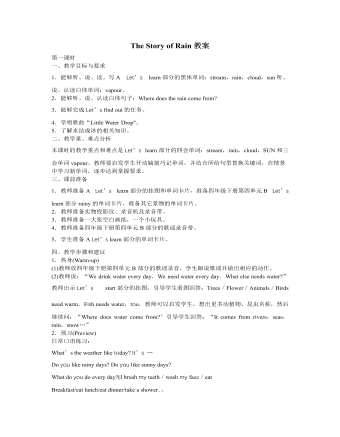
人教版新课标PEP小学英语六年级上册The Story of Rain教案
(2)教师说:“I am going to plant a flower on the weekend.But I don’t know hoⅥ do that.Can you tell me? Who knows?”教师提示学生可以适当用中文解释。如果有学生举手,教师就问:“OK.How d0 you do that?”引导学生回答。“First,put the seeds in the soil.”然后,教师接着说:“What should I do then? 引导学生回答“Water it. (3)教师说:“Zhang Peng is talking to h is teacher.Now Let’s see what they talking about.”学生翻开学生用书,教师放录音,学生跟读。教师解释In several days的意思是几天以后。”教师板书四会句型:How do you do that? What should you do then?学生仿写。 (4)同桌学生进行对话替换操练,可以谈论西瓜(watermelon)、小麦(wheat)等植物的种植过程。然后选几组在班上表演对话。 (5)教师指导学生运用主句型编对话。以下对话供参考: A:How do you clean the classroom? B:First.sweep the floor. A:What should you do after that? B:Then clean the desks and chairs.wash the windows. 4.巩固和延伸(Consolidation and extension) (1)做本单元B Let’s talk部分的活动手册配套练习。
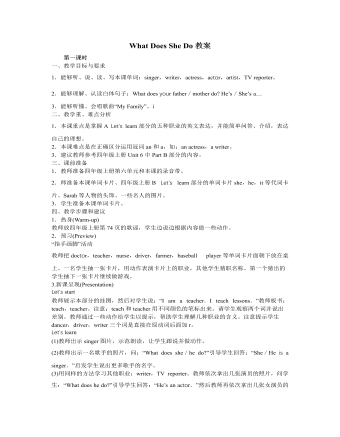
人教版新课标PEP小学英语六年级上册What Does She Do教案
(3)教师就黑板上的内容和学生做对话练习,如:What does your mother do?Where does she work?How does she go to work?教师板书“Where does she work?”和“How does she go to work?”,示范朗读,学生跟说。学生两人一组根据黑板上的语言提示做对话练习。 (4)“看卡片,说句子”活动 教师面前放一摞单词卡片,依次为:职业名称卡片,工作地点卡片和交通方式卡片。活动开始,教师随意从第一摞卡片中抽取一张职业卡片,如:engineer,举起来问:“What does your father do?”学生回答“He’s an engineer.”教师继续抽取一张工作地点卡片,举起来,如:Car company,问:“Where does he work?”学生说:“He works in a Car company.”教师再抽取一张交通方式卡片,如:bus,问:“How does he go to work?学生回答:“He go es to work by bus.”游戏进行几轮后,可以请几名学生轮流代替教师抽卡片,提问题。 (5)教师放本部分的录音,学生跟读。学生两人一组读课文对话。 (6)学生两人一组做对话替换练习。 (7)教师指导学生书写四会句子。 4.巩固和延伸(Consolidation and ex tension) Group work
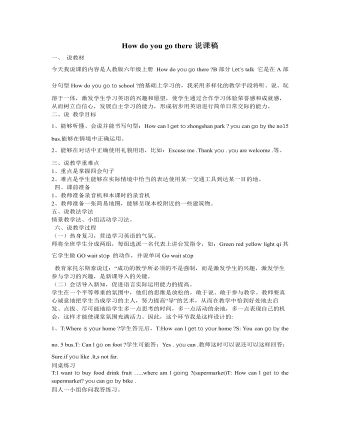
人教版新课标PEP小学英语六年级上册How do you go there说课稿
一、 说教材今天我说课的内容是人教版六年级上册 How do you go there ?B部分Let’s talk 它是在A部分句型How do you go to school ?的基础上学习的,我采用多样化的教学手段将听、说、玩溶于一体,激发学生学习英语的兴趣和愿望,使学生通过合作学习体验荣誉感和成就感,从而树立自信心,发展自主学习的能力,形成初步用英语进行简单日常交际的能力。二、说 教学目标1、能够听懂、会说并能书写句型:How can l get to zhongshan park ? you can go by the no15 bus.能够在情境中正确运用。2、能够在对话中正确使用礼貌用语,比如:Excuse me .Thank you . you are welcome .等。三、说教学重难点 1、重点是掌握四会句子2、难点是学生能够在实际情境中恰当的表达使用某一交通工具到达某一目的地。 四、课前准备 1、教师准备录音机和本课时的录音机2、教师准备一张简易地图,能够呈现本校附近的一些建筑物。
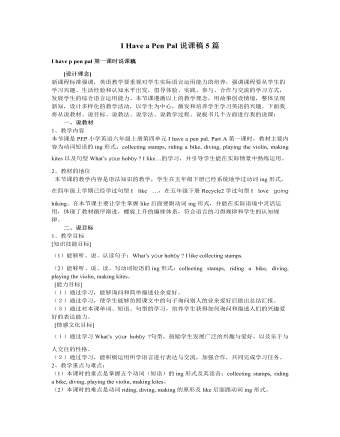
人教版新课标PEP小学英语六年级上册I Have a Pen Pal说课稿5篇
一、说教学思想我在本课教学设计中坚持以人文科技教育为中心,以学生为主体;以兴趣为支点、以交流为目的、以活动任务为途径的教学原则。通过最新的计算机多媒体等教学手段创造贴近生活的教学情境,并在课堂上大量地采用互动式教学模式(包括人机互动),使学生自然进入英语世界;在教学过程中,综合运用情景教学、任务型教学、交际教学、整体语言教学等手段,全面培养学生的听、说、读、写等语言综合运用能力。在课内、课外全面利用网络技术,如在线英语学习、博客(Blog)、魔灯(Moodle)、QQ群、论坛(BBS)等手段,做到英语与信息技术的完美整合。二、说教材与教材处理本课采用的教材是是人教版小学英语(PEP)六年级上册,内容为学生学完I Have a Pen Pal后的一节综合实践活动(复习)课。本单元教学重点为E-mail和英语书信的写法。通过该单元的学习,学生基本了解一些英语书信书写的方法。但是学生还没有利用计算机网络去写英文E-mail(包括写E-mail内容和写E-mail地址。)
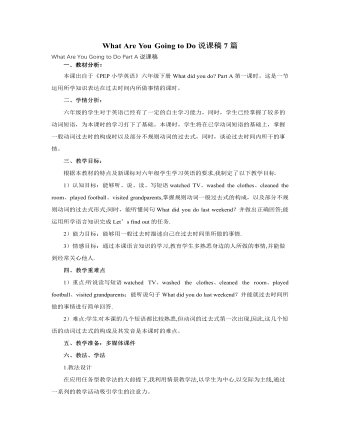
人教版新课标PEP小学英语六年级上册What Are You Going to Do说课稿7篇
四.说教学方法 “任务型”教学方法. 在本课的教学中,学生要完成购买书籍这样一个任务.这给学生创造了一个真实的语境去运用所学的句子进行交际.教师安排了4个活动:单词操练游戏、小组竞赛、小组活动和购物. 五.说教学准备 (一)教师准备:1.单词卡片。2.课件。3.各种书籍。 (二)学生准备:各种书籍. 六.说学习策略 在本节课上,学生可以通过多种方法来学习并记忆单词,如跟读、拼读、分音节、读看实物说单词、听单词拿实物等等.小组竞赛能激发学生的学习热情,鼓励学生表现自己. 七.说教学过程 一.复习和热身(Warm up) 1.唱英语歌曲. 2.朗读“口语天天练”的句子. 3.日常对话. 二.呈现新课(Presentation) 1.播放课件,呈现单词.学生跟读单词. 2.学习新单词. (1)教师带读单词,学生跟读. (2)拼读单词. (3)学生熟读单词.
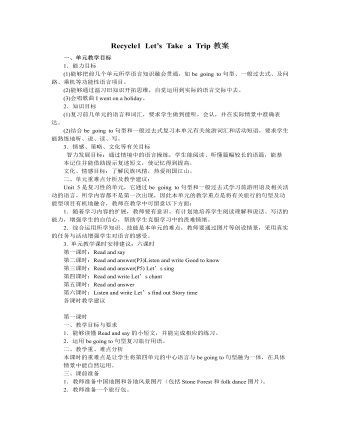
人教版新课标PEP小学英语六年级下册Recycle1 Let’s Take a Trip教案
4.巩固和扩展(Consolidation and extension) (1) 做本单元活动手册配套练习。 (2) 翻卡片说单词。学生两人一组,把单词卡片反面朝上放在桌子上,然后同时翻开两张单词卡(如:going, holiday),就马上组织成一句话(如:Where are you going on the holiday?/ I’m going to Kunming this holiday.),说得快又正确者为胜。 (3) 教师播放C部分Story time的录音或VCD,帮助学生理解故事内容。学生再听一遍录音,跟读故事里的句子,教师指导学生发音。 (4) Bright eyes. 在黑板上张贴Let’s find out的8幅图片,Mike, Zhang Peng, Sarah, Kathy等4个人物图片分别放在8幅图片上,如:Mike ---take pictures---buy presents。学生仔细观察后,请学生闭上眼睛,教师就趁学生闭眼之际交换人物位置(如把Mike放到eat noodles),然后请学生张开眼睛回答:What did Mike do just now ? 引导学生回答: Mike took pictures and bought presents. 教学参考资料库 1.文化背景介绍: 机场标志: Airport 飞机场 Airport lounges 机场休息室Airports shuttle 机场班车 Arrivals 进港Assistance 问讯处Check in area (zone) 办理登机区Departure airport 离港时间Departure times on reverse 返航时间 Welcome aboard 欢迎登机
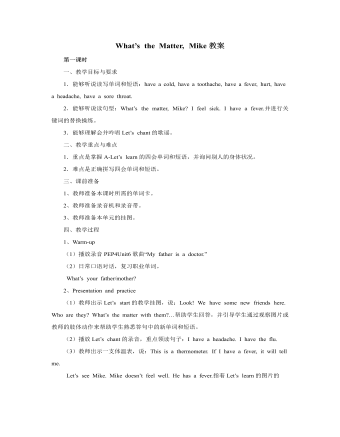
人教版新课标PEP小学英语六年级下册What’s the Matter, Mike教案
回答:She’s sad. She failed the math test.并板书:fail the math test。准备一张很糟的数学试卷,是学生了解语意。进一步教学其他短语a Chinese test, a English test,并 让学生了解pass the Chinese test, pass the English test, pass the math test. (4)教师请学生扮演Sarah,师生对话如下: T: Hello! Sarah, how are you? You look sad today. Sarah: Yes, I failed the math test. 教师接着说:I’m sorry to hear that.让学生理解意思。并引申出句子:I’m glad to hear that.让学生分角色朗读对话。 (5)Let’s check.让学生看Sarah的表情,并读两篇对话,选出正确的答案。 (6)活动名称:心理医生 活动目的:操练句型“How are you? You look…”.学生间自由组合编排对话.通过对话对学生展开情感教学,让学生理解健康的体魄和愉悦的心情的心情是一个人成功的重要因素,使学生形成良好的心理健康状态。 活动过程:A: How are you? You look bored today. B: Yes. I failed my math test. A: I’m sorry to hear that. Believe yourself. Work hard. You can pass the text next time. (7)活动名称:难忘时刻 活动目的:围绕照片上的表情展开询问和讨论.操练句型 “How do you feel? How does she/he feel?

人教版新课标PEP小学英语六年级下册Last Weekend说课稿9篇
一、教学内容分析1. 教学内容介绍:.本课是一节复习课,复习内容为Last Weekend A B 两部分。教学主要是10个词组和2个句型,并结合六年级学生即将毕业,在原有教材的基础上融入了大量有关周末活动的句型和短语。使学生在“周末活动”这一话题下,尽可能多地滚动复习更多相关的动词短语。本课要掌握的短语和句子有Words and phrases: watched TV; washed clothes; cleaned the room; played football; visited grandparents; read a book; went to a park; went swimming; went hiking; went fishing;Key sentences: What did you do last weekend? I played football; Did you read books? Yes, I did. No, I didn’t.2. 知识的前后联系:Last weekend的话题是周末活动,关于日常活动的话题已在小学课本中多次出现,例如在B4U2; B5U2; B5U4; B6U1; B6U5; B7U3;B8U3中7次出现。在进行U3 last weekend的复习中,对周末活动的内容要进行深化。除了要求学生能够“四会”掌握本单元的词汇外,还应注意培养学生听、说、读、写的能力,让学生在一定的情景中在句中运用单词,在篇章中运用句子,赋予单词、句子特定的意义,而不是孤立地学习单词和句子,使学生一看到这些单词就能在一定的情景下使用,进而组合这些句子形成篇章,从而培养学生综合运用语言的能力。

人教版新课标PEP小学英语六年级下册My Holiday说课稿5篇
本课时是本单元的第二课时,属对话课,它是对第一课时词汇课学习的一种巩固和延伸,同时也是下一课时阅读课的铺垫,因此起着承前启后的作用。二、学情分析通过三年多的英语学习,大部分学生已具备了一定的英语学习能力,他们能够听懂有关熟悉话题的语段,能与教师或同学就熟悉的话题交换信息,能读懂简短的的语篇。对于本文中的重点语法项目一般过去时,属于上一单元已学内容,本单元旨在继续巩固其用法,所以学生对该内容不是很陌生。三、教学方法及手段1.教学方法小学英语教学应该把培养学生的学习兴趣、调动学生学习英语的主动性作为教学重点,根据学生的认知规律,本课在应用任务型教学法的大前提下,利用情景教学法以及TPR教学法相结合,以学生为中心,以交际为主线,通过一系列的教学活动吸引学生的注意力,努力让学生积极参与,学以致用,并在用的过程中发展语言能力、思维能力以及交流合作的能力。
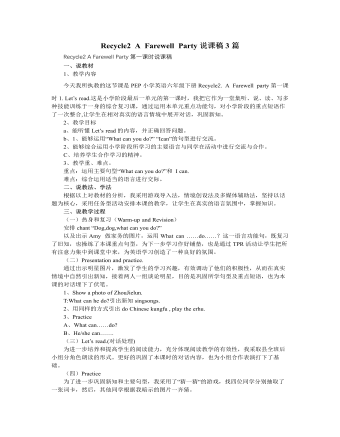
人教版新课标PEP小学英语六年级下册Recycle2 A Farewell Party说课稿3篇
教学目标:(1)知识目标:1.能够听、说、认读句子:Let's read, Let's make ,listen,write,match and say 中的句子。2.能够听懂 Listen and write 部分的录音并正确填写句子。(2)能力目标:通过教学,使学生能够了解英语请柬的内容并会模仿书写英语请柬。(3)情感目标:培养师生之间和同学之间的友谊与情感,积极鼓励学生展现才能。三、说教学重点:1.能够听、说、认读句子:"We're going to have a farewell party . How do you feel? I feel …."四、说教学难点:Is every having a good time?五、说教法:1. 教法设计本节课中,在教学过程中注意发挥学生的主动积极性,给学生一个轻松愉快的语言学习氛围,让学习过程充满乐趣,同时使他们感受到一定的挑战,满足他们的成就感,使思维始终处于积极状态。2. 学法指导重视多元智能教学原理、合作学习法和任务型语言学习法等应用,充分调动学生的感觉器官,想象能力,激发学生积极参与课堂教学活动。

新人教版高中英语必修3Unit 1 Festivals and celebrations-Discovering Useful Structure教学设计
4.That was an experience that frightened everyone. →That was _____________________. 答案:1. taking 2. being discussed 3. in the reading room 4. a frightening experienceStep 6 The meaning and function of V-ing as the predicative动词-ing形式作表语,它通常位于系动词后面,用以说明主语“是什么”或“怎么样”一种表示主语的特质、特征和状态, 其作用相当于形容词; 另一种具体说明主语的内容, 即主语等同于表语, 两者可互换。The music they are playing sounds so exciting. 他们演奏的音乐听起来令人激动。The result is disappointing. 结果令人失望。Our job is playing all kinds of music. 我们的工作就是演奏各种音乐。Seeing is believing. 眼见为实。Step 7 Practice1. It is ________(amaze) that the boy is able to solve the problem so quickly.2. Buying a car is simply _______(waste) money. 3. Please stop making the noise—it’s getting ________(annoy). 4. complete the passage with the appropriate -ing form.La Tomatina is a festival that takes place in the Spanish town Bunol every August. I think many food festivals are __________ because people are just eating. however, this festival is _________ because people don't actually eat the tomatoes. Instead, they throw them at each other! the number of people ________ part in this tomato fight, can reach up to 20,000, and it is a very __________ fight that lasts for a whole hour. The _______ thing is how clean Bunol is after the tomatoes are washed away after the fight. this is because the juice form tomatoes is really good for making surfaces clean!答案:1. amazing 2. wasting 3. annoying4. boring interesting taking exciting amazing

新人教版高中英语必修3Unit 1 Festivals and Celebrations-Reading for Writing教学设计一
The topic of this part is “Write about your festival experience”.During the Listening and Speaking and Talking, students are just asked to say out their festival experiences such as the Spring Festival, Mid-autumn Day, but this part students will be asked to write down their own festival experiences. During the reading part, it introduces the Naadam Festival in Inner Mongolia Autonomous Region, which can give students a good example to imitate. Students not only learn the festival, but touch and feel the Inner Mongolian’s character, the spirit and cultural atmosphere, which can help students form the cultural awareness and learn to enjoy and value the diversity of Chinese culture.Concretely, the dairy tells the experience that the author spent the Naadam Festival in Inner Mongolia Autonomous Region with his/her friend. The structure is clear. In the opening paragraph, it introduces the topic of the Naadam Festival and the whole feeling. Then it introduces the items of the festival like the ceremony, wrestling and horse racing. Finally, it summarizes this experience. Because this part is a travel journal, we must guide students pay more attention to these details: 1. use the first person. 2. use the past tense to tell the past thing and use the present or future tense to describe the scenery. 3. use the timeline to tell the development. 4. be careful for the author’s psychology, emotion and feeling, etc.1. Read quickly to get main idea; read carefully to get the detailed information about Naadam Festival.2. Learn the structure of the reading article and language.3. Write an article about a festival experience4. Learn to use the psychology, emotions and feeling in the writing.1. Write an article about a festival experience.2. Use the structure of the reading article and language.

新人教版高中英语必修3Unit 2 Morals and Virtues-Reading and Thinking教学设计
The topic of this part is “Learn to make choices in life”.The Listening & Speaking & Talking part aims at the moral dilemmas, and this part is about making choices in life. The heroin is Lin Qiaozhi, a famous medical scientist, made a great contribution to our country’s medical care. Most importantly, her life experience can inspire our students whether in studying or the development of career. she had moral dilemmas and life choices, which are similar to the students who will step into society. Besides, Lin has quite good virtues like kindness, self-improvement, insistence, job-loving , generosity and responsibility, which is worth being learned.Concretely, this article is a biography about Lin Qiaozhi. The article tells her whole life according the timeline, among which the life choices is emphasized. For example, whether married or chased her dream, returned home or stayed abroad, family or public, her choices all reflected her faith, spirit, responsibility and devotion.1. Fast reading to get the detailed information about Lin Qiaozhi; careful reading to do the deductive information.2. Learn the reading skills--deductive judgement according the context.3. Study the structure features and language features. 4. Communicate about Lin’s life choices and reflect their own life choices.1. Learn the reading skills--deductive judgement according the context.2. Study the structure features and language features.3. Communicate about Lin’s life choices and reflect their own life choices.Step 1 Lead in---Small talkWhat are some important life choices?Importance choices: university study, jobs and marriage partners. Because they can determine our future.

新人教版高中英语必修3Unit 3 Diverse Cultures-Discovering Useful Structure教学设计
Step 4 PracticeRead the conversation. Find out which words have been left out.Justin: Linlin, I’m going to Guizhou Province next month. I’m super excited! Any recommendations for places to visit?Linlin: Wow, cool! Guizhou is a province with a lot of cultural diversity. Places to visit...well, definitely the Huangguoshu Waterfall first.Justin: What’s special about the waterfall?Linlin: Well, have you ever heard of the Chinese novel Journey to the West ?Justin: Yes, I have. Why ?Linlin: In the back of the waterfall, you will find a cave, which is the home of the Monkey King.Justin: Really? Cool! I’ll definitely check it out.Linlin:And I strongly recommend the ethnic minority villages. You’ll find Chinese culture is much more diverse than you thought.Justin:Sounds great, thanks.Answers:Justin: Linlin, I’m going to Guizhou Province next month. I’m super excited! Do you have any recommendations for places to visit?Linlin: Wow, that’s cool! Guizhou is a province with a lot of cultural diversity. What are some places to visit in Guizhou ? Well, definitely the Huangguoshu Waterfall is the first place to visit in Guizhou Province.Justin: What’s special about the waterfall?Linlin: Well, have you ever heard of the Chinese novel Journey to the West ?Justin: Yes, I have heard of the Chinese novel Journey to the West . Why do you ask if I have heard of the Chinese novel Journey to the West?Linlin: In the back of the waterfall, you will find a cave, which is the home of the Monkey King from Journey to the West.Justin: That’s really true? It’s Cool! I’ll definitely check it out.Linlin:And I strongly recommend the ethnic minority villages on your trip to Guizhou Province. You’ll find Chinese culture is much more diverse than you thought it was.Justin:This all sounds great, thanks.

新人教版高中英语必修3Unit 3 Diverse Cultures-Listening &Speaking&Talking教学设计
1. In Picture 1 and Picture 2, where do you think they are from? How do you know?From their wearings, we can know they are from ethnic minority of China--- Miao and Dong.Picture 1, they are playing their traditional instrument lusheng in their traditional costumes.Picture 2. the girls are Miao because they wear their traditional costumes and silver accessory.2. In Picture 3, can you find which village it is? What time is it in the picture?It is Dong village. It is at night. Step 2 While-listeningJustin met a new friend while traveling in Guizhou. Listen to their conversation and complete the summaries below.Part 1Justin and Wu Yue watched some Miao people play the lusheng. The instrument has a history of over 3,000 years and it is even mentioned in the oldest collection of Chinese poetry. Then they watched the lusheng dance. Justin wanted to buy some hand-made silver/traditional accessories as souvenirs. He was told that the price will depend on the percentage of silver. Part 2They will go to a pretty Dong minority village called Zhaoxing. they will see the drum towers and the wind and rain bridges. They may also see a performance of the Grand Song of the Dong people.Step 3 Post-listening---TalkingWork in groups. Imagine Justin is telling some friends about his trip to Guizhou. One of you is Justin and the rest of you are his friends. Ask Justin questions about his trip and experience. The following expressions may help you.

新人教版高中英语必修3Unit 4 Space Exploration-Listening&Speaking&Talking教学设计二
The themes of this part are “Talk about how to become an astronaut” and “Talk about life in space”. As Neil Armstrong said “Mystery creates wonder and wonder is the basis of man’s desire to understand. Space is difficult for human to reach, therefore, humans are full of wonders about it. However, if wanting to achieve the dream of reaching the Moon, some of our human should work hard to be an astronaut at first. Part A(Talk about how to become an astronaut) is a radio interview in a radio studio, where the host asked the Chinese astronauts about his story how to become an astronaut. Yang Liwei told his dreamed to be an astronaut since childhood. Then he worked hard to get into college at 22. The next 10 years, he gradually became an experienced pilot. At the same time, to be an astronaut, he had to study hard English, science and astronomy and trained hard to keep in good physical and mental health and to practise using space equipment. Part B (Talk about life in space) is also an interview with the astronaut Brown, who is back on the earth. The host Max asked about his space life, such as his emotion about going back the earth, the eating, shower, brushing, hobbies and his work. Part A and Part B are interviews. So expressing curiosity about the guests’ past life is a communicative skill, which students should be guided to learn.1. Students can get detailed information about how Yang Liwei became an astronaut and Max’s space life.2. Students learn to proper listening strategy to get detailed information---listening for numbers and taking notes.3. Students can learn related sentences or phrases to express their curiosity like “ I wish to know...” “I’d love to know...”4. Students can learn more about the space and astronauts, even be interested in working hard to be an astronaut

新人教版高中英语必修3Unit 4 Space Exploration-Reading and Thinking教学设计一
Q4: What is the function of the International exploration ?Having astronauts from different countries on boardQ5: What can you learn from Para 4 ?China has made great achievements in exploring spaceQ6: What is the attitude to the space exploration ?SupportiveStep 6 Post reading---RetellPeople have always wanted to learn more about space. Before the mid-20th century, most people felt (1)_________ (travel) into space was an impossible dream. However, (2)____ the help of scientists, peoplesucceeded in realizing their dream (3) _________ (explore) space. On 4 October 1957, the Sputnik 1 satellite (4) ____________(launch) by the USSR. (5) ________________ scientists try to make sure nothing goes wrong, accidents can still happen. These disasters made everyone(6)___________(disappoint), but people still believe in the importance of (7) ________(carry) on space exploration. In 2003, China became the third country to (8)_____________ (independent) send humans into space. Then Shenzhou 6 and 7 completed (9)____ second manned orbit and the first Chinese spacewalk. In spite of the difficulties, scientists hope future (10)__________ (discovery) will not only enable us to understand the universe but also help us survive well into the future.Answers: 1. travelling 2. with 3. to explore 4. was launched 5. Although6. disappointed 7. carrying 8. independently 9. a 10. discoveriesStep 6 Post reading---Critical thinkingQ1: What do you think of the space exploration ? I think it is beneficial to us. Through further study of space, people will make full use of it in the future, such as the space experiments by Wang Yaping in Tian Gong 1.Q2: If you are determined to be an astronaut, what should you prepare at present ?First of all, I should study hard to get a related college degree. Besides, I must keep mental and physical healthy.Step 7. HomeworkTry to summarize the structure of the article by a mind map.

新人教版高中英语必修3Unit 5 The Value of Money- Discovering Useful Structure教学设计
Step 3 Meaning1. 过去将来时表示从过去某一时间来看将要发生的动作或存在的状态, 常用在宾语从句中。一般由“would/should +动词原形”构成。She hoped that they would meet again someday. 她希望将来有一天他们能再见面。2. was/were going to+动词原形: 表示过去将要发生或很有可能发生的动作, 常用于口语中, 表示预言、意图或者打算等。He was going to start work the following week. 他打算下星期开始工作。3. was/were about to do: 常用来表示即将发生的动作, “刚要/正要做……”。注意该结构不与任何时间状语连用。I felt that something terrible was about to happen. 我感到某种可怕的事情即将发生。4.was/were to do: 表示“曾计划做某事”, 如果表示“本来计划做某事, 动作没实现”, 则需用 “was/were to have done”。She said she was to have told me about the accident. 她说她本来想告诉我关于事故的事。5.Start, go, come, leave, see, meet等动词的过去进行时: 表示就过去某一时刻而言即将发生的动作。She was coming later. 她随后就来。I had just put on my overcoat and was leaving to visit a friend of mine. 我刚穿上外套要去看我的一个朋友。

新人教版高中英语必修3Unit 5 The value of money-Reading and Thinking教学设计二
? Could you offer me some kind of work here?? I don’t want your charity, I just want an honest job.? Careless: I landed in Britain by accident.Step 7:Consolidation.? Find Henry? Roderick and Oliver were I .making a bet when they saw Henry, a poor young man. ? Know Henry? About a month ago, Henry was sailing and later he found himself carried out to sea by a strong wind. Fortunately, he 2.was spotted by a ship. And it was the ship that brought him to 3.England? Offer money to Henry ? Oliver and Roderick gave Henry a letter and told him that there was money in it. They 4.persuaded him to accept it, and made him 5.promise that it wouldn't be opened until 2 o'clock.Step 8:Language pointsa large amount of: a large quantity of; a great deal ofe.g. They bought a large amount of furniture before they moved their new house.make a bet: make an arrangement to risk money, etc. on an event of which the result is doubtful.e.g. We made a bet on the result of the match.permit sb to do something: allow somebody to do somethinge.g. My mother doesn’t permit me to ride in the street after it rained.by accident: as a result of chancee.g. I only found it by accident.stare at: look at somebody or something with the eyes wide open in a fixed gaze( in astonishment, wonder, fear, etc)to be honest: to tell you the truth; to be franke.g. To be honest, I don’t think we have a chance of winning.Step7 Homework:What do you think will happen to Henry? Will the bank-note help him or get him into trouble?

新人教版高中英语必修3Unit 5 the value of money-Reading For Writing教学设计一
【参考范文】Narrator:(Henry is smiling as he leaves the restaurant. As he is walking down the street, he sees a sign for a place that cuts hair. He decides to get it cut. )H=Henry;B=Barber;R=rude manH:Good afternoon, I'd like to get a cut, if I may. (The barber looks at Henry's hair and continues cutting another man's hair. )Er, I'd really like a haircut. As you can see it's much too long. B:(in a rude manner) Yes, I can see that. Indeed, I can. H:Fine, well I'll have a seat then. (He sits in one of the barber's chairs. The barber turns to look at Henry. )B:It's quite expensive here, you know!Are you sure you can afford it?H:Yes. I think so. (In comes the rude man. )R:Hey you there. I need a haircut quickly. Can you do me straightaway?B:All right, then, get in the chair and I'll see what I can do. R:Thank you. (sits down in one of the barber's chairs)H:Excuse me, but I was here first. Aren't you going to do my hair first?B:This man's in a hurry. H:Well so am I!I insist that you cut my hair first. B:OK, but I'll have to be quick. This gentleman is waiting. H:Thank you. (They both become quiet. After his hair is cut, the barber tells Henry how much he must pay. Henry shows the barber the bank note. )B:Why, Mr . . . (looks shocked)H:Adams. Henry Adams. I'm sorry, I don't have any change. R:You're that Mr Adams! Well,I'm glad I waited or I might never have known it was you. B:Why, Mr Adams, please don't worry!(wearing a big smile) Nothing to worry about!Nothing at all!Please come back any time, even if you only need too little hairs cut!It will be my honour to serve you!

